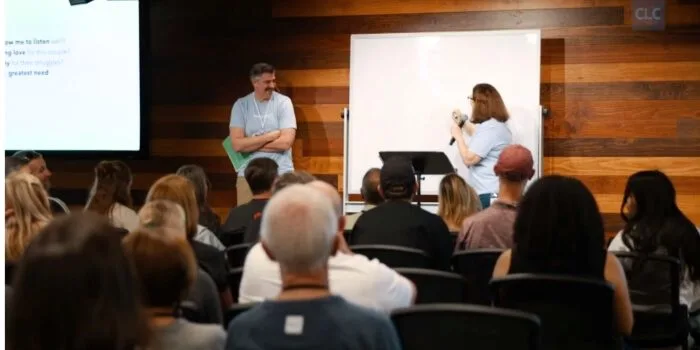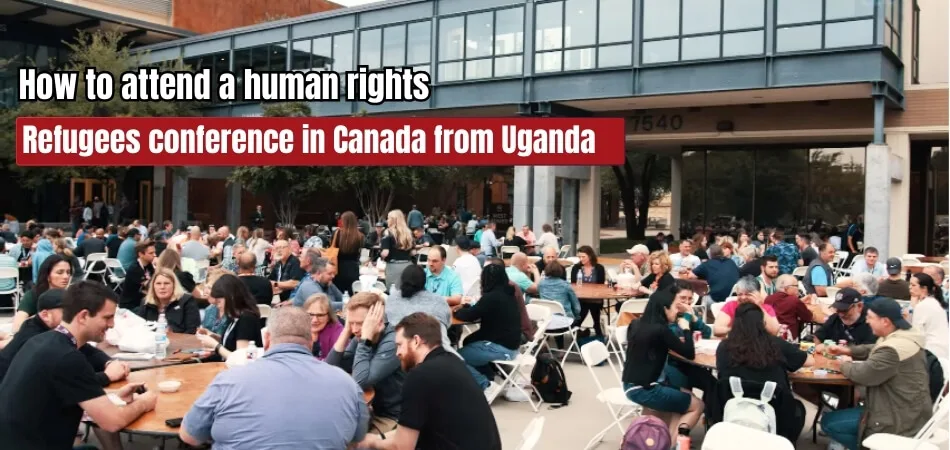Attending a conference on human rights and refugees can be a life-changing experience, especially for those passionate about advocating for underprivileged communities. For Ugandans eager to engage in meaningful dialogues and collaborate on solutions, learning how to attend a Human Rights and Refugees Conference in Canada from Uganda is essential. It opens doors to new perspectives and global networks that can amplify your voice.
To get started on this journey, start by researching upcoming conferences, applying for a visa, and securing funding. Preparing your travel and accommodation in advance ensures a smooth experience. Don’t forget to connect with other participants, as networking is a key aspect of such events.
By attending, you’ll gain insights into pressing issues and contribute to critical conversations. So, if you’re ready to explore the world of human rights, continue reading to discover how you can make your attendance a reality.
Purpose of a Conference on Human Rights and Refugees
Conferences on human rights and refugees serve multiple essential purposes that resonate deeply with advocates, policymakers, and communities alike. First and foremost, they create a platform for raising awareness about pressing human rights issues.
Participants share personal stories, statistics, and research findings, shedding light on the challenges faced by refugees and marginalized groups. This shared knowledge promotes a greater awareness of the complexities surrounding these issues. Many attendees are inspired to join Canadian Human Rights and Refugees Conferences, further developing their knowledge and involvement.
Moreover, such conferences encourage dialogue among diverse stakeholders, including NGOs, government representatives, academics, and affected communities. This collaborative environment nurtures discussions about best practices, innovative solutions, and effective policies to support refugees. By bringing together various perspectives, these gatherings promote a holistic approach to addressing human rights concerns.
Networking is another vital aspect of these conferences. Attendees have the chance to build meaningful relationships with like-minded individuals, organizations, and potential collaborators. These connections can lead to future partnerships, joint initiatives, and advocacy efforts that extend beyond the conference itself.
Additionally, conferences often feature workshops, panel discussions, and keynote speakers who are experts in the field. These educational components equip participants with practical tools and strategies for their advocacy work.
Ultimately, a conference on human rights and refugees not only highlights urgent issues but also inspires action and creates a sense of community among those dedicated to promoting justice and equality for all.
Different Types of Human Rights and Refugees Conference
Human rights and refugee conferences come in various forms, each focusing on different aspects of these critical issues. Let’s explore some common types.
Academic Conferences
These conferences bring together scholars, researchers, and students to discuss theoretical frameworks, present research findings, and explore academic perspectives on human rights and refugee issues. They often include panel discussions, keynote speeches, and paper presentations.
Advocacy Conferences
Organized by NGOs, advocacy groups, or international organizations, these conferences aim to raise awareness, mobilize support, and influence policy. They focus on practical solutions, sharing success stories, and networking for collaborative efforts.
Legal and Policy Conferences
These gatherings focus on the legal aspects of human rights and refugee protection. Lawyers, policymakers, and government officials discuss international laws, treaties, and policies, exploring ways to strengthen legal frameworks and enforcement mechanisms.
Community and Grassroots Conferences
These conferences highlight the voices of refugees and community activists. They emphasize local initiatives, community engagement, and empowering refugees to advocate for their rights and well-being.
Each type of conference plays a crucial role in advancing the cause of human rights and providing support for refugees, offering unique perspectives and approaches to tackle these global challenges.
How to Attend a Human Rights and Refugees Conference in Canada from Uganda?
Are you passionate about human rights and interested in attending a conference on this topic in Canada, all the way from Uganda?
It’s an exciting opportunity to engage with global issues, learn from experts, and network with like-minded individuals. Do you know how to attend a human rights and refugees conference in Canada from Uganda? If not, then you are in the right place!
To make this journey, there are several steps you’ll need to follow. Let’s dive into the step-by-step process to ensure you have a smooth experience from start to finish.
Step 1: Research and Select a Conference
The first step in your journey is to research and select a conference that relates to your interests in human rights and refugee issues. Take your time exploring various events; each conference offers unique perspectives, speakers, and agendas that can deepen your knowledge of pressing global challenges.
Once you’ve identified a few options, visit their websites for essential details. Look for information on speakers, topics, and the registration process. This thorough exploration will help you choose a conference that truly aligns with your goals and aspirations.
Step 2: Register for the Conference
After selecting a conference that aligns with your interests, the next step is to register. This typically involves filling out an online form with your details and paying a registration fee. Keep an eye out for early bird rates, as these can save you money and ensure your spot at the event.
Completing your registration as soon as possible not only secures your place but also gives you ample time to prepare. By getting ahead of the game, you can focus on networking and absorbing valuable insights once the conference begins.
Step 3: Request an Invitation Letter
Reaching out to the conference organizers for an official invitation letter is a crucial step in your journey. This letter serves as proof of the event’s legitimacy and your intent to attend, which is vital for your visa application.
When you contact them, clearly express your excitement about participating and how it aligns with your advocacy goals. Many individuals who are passionate about this cause wish to join Human Rights and Refugees Conference events, so a warm, respectful tone can create a positive response, helping you secure this important document and move forward in your preparations.
Step 4: Apply for a Canadian Visa
To attend a conference in Canada, obtaining a visa is a crucial step for Ugandan citizens. Start by visiting the Canadian embassy’s website in Uganda to familiarize yourself with the visa application process. This resource will guide you through the requirements and timelines, ensuring you’re well-prepared.
Gathering the necessary documents—such as your passport, invitation letter, proof of accommodation, and financial statements—is vital. Submitting your application well ahead of your travel dates will help avoid any last-minute stress and increase your chances of a smooth journey.
 Step 5: Book Travel and Accommodation
Step 5: Book Travel and Accommodation
Once your visa is in hand, it’s time to secure your travel arrangements. Start by comparing flight options to find the best deals that fit your schedule. Booking early can save you money and ensure you have a seat on your preferred flight.
When it comes to accommodation, consider staying close to the conference venue. This not only reduces travel time but also gives you more opportunities to network with other attendees. A well-chosen lodging option can improve your overall experience, allowing you to focus on the event.
Step 6: Prepare for the Conference
Preparing for the conference is crucial to making the most of your experience. Start by reviewing the agenda to identify sessions and workshops that relates to your interests. Researching the speakers will give you valuable insights into their work, enabling you to engage more meaningfully during discussions.
If you’re presenting, take extra time to polish your materials. Practice your presentation multiple times to build confidence. Being well-prepared not only improves your learning but also helps you connect with others who share your passion.
Step 7: Travel to Canada
Before you set out on your journey to Canada, double-check that you have all essential travel documents: your passport, visa, and confirmation of your conference registration. Having everything in order will give you peace of mind and ensure a smooth entry into the country.
Consider arriving a few days early to acclimate to the time zone and enjoy some local sights. This extra time allows you to unwind, explore the culture, and perhaps even network with fellow attendees before the conference begins.
Step 8: Attend the Conference
Attending the conference is your opportunity to immerse yourself in vital discussions about human rights and refugee issues. Participate actively in sessions and workshops, as these forums allow you to absorb valuable insights, ask thought-provoking questions, and deepen your knowledge of complex topics.
Don’t shy away from networking events, either. Engaging with fellow attendees can lead to meaningful connections and collaborative opportunities. Remember, your voice matters, so take notes, share your experiences, and contribute to the dialogue to enrich your conference journey.
Step 9: Follow Up After the Conference
Following up after the conference is a vital step in solidifying the connections you’ve made. Take the time to send personalized messages to your new contacts, expressing gratitude for their insights and conversations. A simple note can leave a lasting impression.
Additionally, consider connecting on LinkedIn to keep the dialogue going. This platform offers a space to share ideas, explore potential collaborations, and stay updated on each other’s work. Building these relationships can pave the way for future opportunities and meaningful partnerships.
By following these steps, you can successfully attend a Human Rights and Refugees Conference in Canada from Uganda, gaining valuable insights and making meaningful connections in the field.
Human Rights and Refugees Conferences: Who Attends?
A Human Rights and Refugees Conference attracts a diverse group of individuals and organizations, all united by a common goal: to address and improve the situation of refugees and protect human rights.
Let’s take a closer look at who attends these important events:
- NGO Representatives: Non-governmental organizations (NGOs) working in the fields of human rights and refugee support send their representatives to share experiences, learn from others, and form partnerships.
- Government Officials: Policymakers and government officials participate to gain insights, discuss policies, and engage with other stakeholders to improve their response to refugee crises and human rights issues.
- Academics and Researchers: Scholars and researchers present their findings, engage in debates, and contribute to the academic discourse on human rights and refugee studies.
- Activists and Advocates: Individuals and groups advocating for human rights and refugee rights attend to raise awareness, share stories, and mobilize support for their causes.
- Legal Professionals: Lawyers and legal experts specializing in human rights and refugee law participate to discuss legal frameworks, share best practices, and offer pro bono services.
- Refugees and Displaced Persons: Their firsthand experiences and testimonies are crucial for understanding the realities of displacement and the importance of protecting human rights.
Each attendee brings a unique perspective and expertise to the conference, contributing to a comprehensive and multifaceted approach to addressing the challenges faced by refugees and promoting human rights.
Is It Significant to Attend a Human Rights and Refugees Conference?
Yes, attending a human rights and refugees conference is significant. These events provide valuable opportunities for learning, networking, and advocating for change.
Let’s explore some key factors that highlight their importance.
Awareness and Education
Conferences shed light on the latest issues, trends, and challenges in human rights and refugee matters. They offer a platform for sharing knowledge and raising awareness among participants and the wider community.
Networking and Collaboration
Attendees can connect with like-minded individuals, organizations, and experts. Moreover, participating in Human Rights and Refugees Conference events often leads to collaborations, partnerships, and joint initiatives that can amplify the impact of their work.
Advocacy and Influence
Conferences serve as a stage for advocating for policy changes, mobilizing support, and influencing decision-makers. The collective voice of participants can lead to tangible improvements in the lives of refugees and the protection of human rights.
Personal and Professional Development
Participants can enhance their skills, gain new insights, and stay updated with best practices in their field. This professional growth can lead to more effective and impactful work in their respective areas.
These kinds of conferences are not only significant but also beneficial for event individuals and organizations committed to making a difference in these critical areas.
Tips to Have a Fruitful Attendance at Human Rights and Refugees Conference
This can be a transformative experience, offering opportunities to learn, network, and contribute to important discussions. To make the most of your attendance, consider the following tips.
- Set Clear Goals: Before the conference, identify what you hope to achieve. Are you looking to gain knowledge, meet specific individuals, or raise awareness about a particular issue? Having clear goals will guide your actions during the event.
- Plan Your Schedule: Review the conference agenda in advance and prioritize sessions that align with your interests and goals. Be sure to include some time for networking and informal discussions.
- Engage Actively: Participate in discussions, ask questions, and share your experiences. Active engagement will enrich your conference experience and help you gain deeper insights.
- Network Intentionally: Seek out opportunities to connect with other attendees, speakers, and organizers. Exchange contact information and follow up after the conference to maintain and build these relationships.
- Take Notes: Keep a record of key points, ideas, and contacts. These notes will be valuable for reflecting on your experience and applying what you’ve learned in your work or advocacy.
- Follow Up: After the conference, reach out to the contacts you’ve made, explore potential collaborations, and share your learnings with your community or organization.
These tips can ensure you a fruitful attendance at these conferences, making the most of the opportunities it presents.
Frequently Asked Questions
Managing the process of attending a human rights and refugees conference can feel overwhelming, especially from abroad. To help you, we’ve compiled a list of frequently asked questions that will guide you through the essential steps of this journey.
Is funding available for attending conferences abroad?
Yes, various organizations and institutions offer funding opportunities for individuals attending conferences. Research grants, scholarships, or sponsorships specifically aimed at human rights initiatives to help cover your travel and accommodation expenses.
How can I find upcoming human rights conferences in Canada?
You can find upcoming conferences by searching online platforms, following human rights organizations, and checking university websites. Social media groups focused on human rights can also provide valuable information and networking opportunities.
Are accommodations available near the conference venue?
Yes, many conferences provide information about nearby accommodations. Options vary from hotels to hostels. Booking in advance is recommended to ensure you find a place that fits your budget and preferences.
What should I prepare for the conference?
Prepare by researching conference topics, outlining key issues you want to discuss, and bringing relevant materials. Familiarizing yourself with speakers and their work can help you engage in meaningful conversations during the event.
Can I volunteer at the conference?
Yes, many conferences welcome volunteers to assist with various tasks. Volunteering not only allows you to contribute but also offers unique networking opportunities and firsthand experience of the conference dynamics.
Bottom Lines
A series of steps is required to attend this kind of conference in Canada from Uganda, starting with researching and registering for the event. It’s essential to request an invitation letter for your visa application and ensure you have all the necessary travel documents.
When considering how to attend a human rights and refugees conference in Canada from Uganda, planning your travel and accommodation is crucial for a smooth experience.
Engage actively during the conference and take the opportunity to network. Don’t forget to follow up with new contacts after the event. With careful preparation and a proactive approach, you can make the most of this enriching experience.








